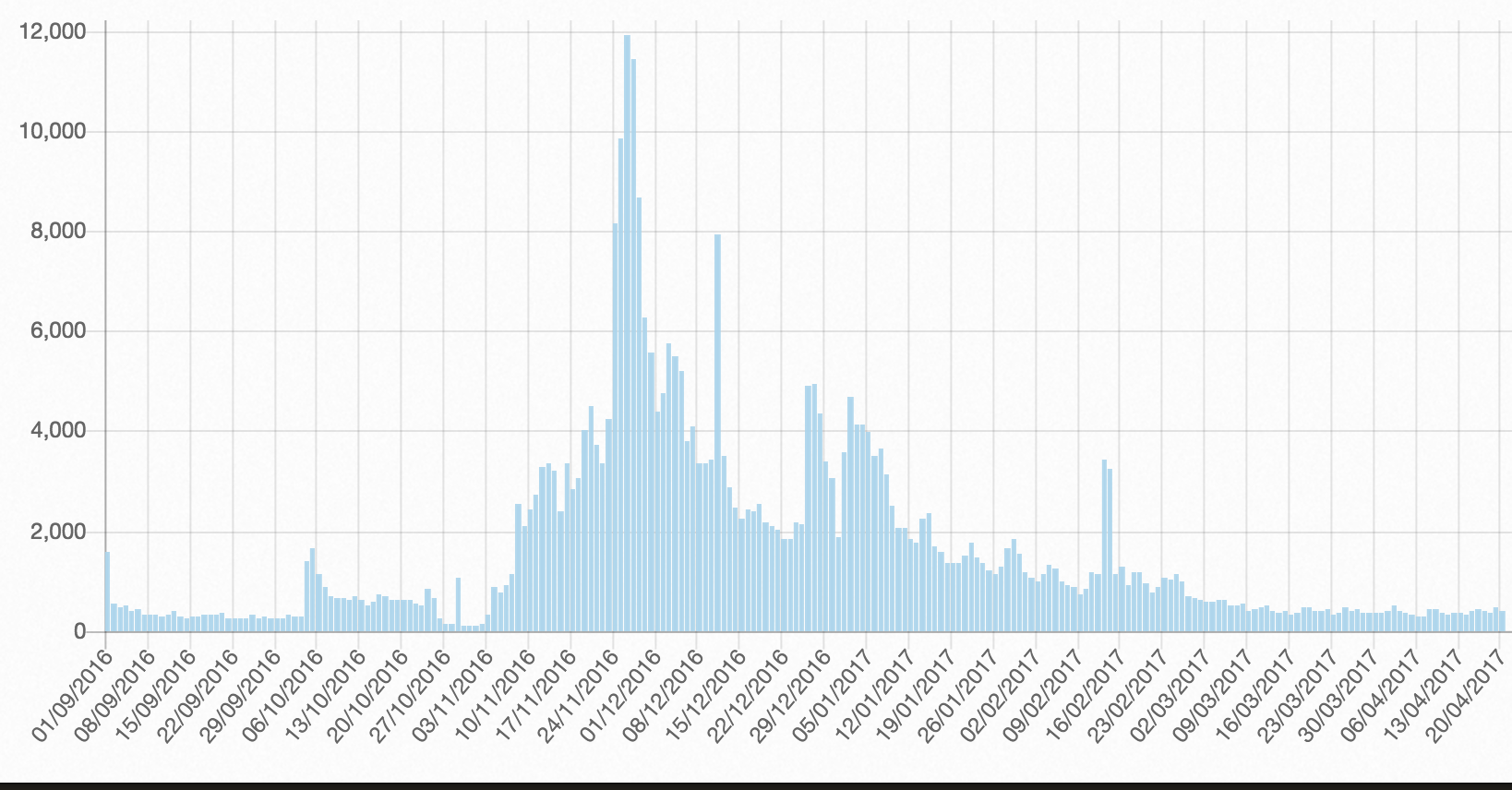Thousands selected article. How does the review in Wikipedia

On April 21, Russian Wikipedia selected its thousandth in a row. Selected article: Twenty-eight Panfilov members . It so happened that I wrote it mainly. Interestingly, after that I received a lot of questions about the criteria for selecting articles. Taking this opportunity, I would like to talk about how the public review is arranged in this amazing crowdsourcing project and how you can raise your level of critical thinking by participating in writing an encyclopedia.
And let's remove it?
First, someone writes a small article, and someone else immediately exposes it for deletion. For example, because it is small. Or because it is on an irrelevant topic.
A discussion section is created, such as this one .
The discussion is not a vote, but rather a discussion. Participants swear by appealing to the rules. Summing up (the judge) weighs the pros and cons. If a decision is made to leave a page, a corresponding die appears on it on its discussion page. After that, it is much more difficult to put an article on deletion.
Good Article

Consensus and war of edits
In discussions and revisions, the concept of consensus is actively used. A curious picture showing how agreement is reached on Wikipedia. On the x-axis, the editorial staff of the article, and y visualizes with color who owns this or that piece of article. See the sawtooth structure? In the article, one participant added a suggestion, and the other canceled this edit. And first canceled the cancellation. Well, and so on. By the way, the topic of the article in the picture is "Chocolate". I invite everyone to imagine what is happening on the article about abortion, feminism or Trump.
According to the rules of Russian Wikipedia, you can get a ban for this. After the first cancellation, participants should contact each other and begin searching for consensus. In the wiki, it is defined peculiar. If I made a revision about which a significant number of my co-authors found out, and none of them canceled it, then everyone is happy with everything, and the article is consensus. In discussions and dialogues, the consensus is as follows:
Participant A : In this place of the article you have to redo this and that.
Participant B : It seems to me that it is enough to redo this and that (justifies why).
Participant A : (offended silent)
Well, if he is silent, then everything is all right now. And if he continues to insist, citing all the new arguments, someone may come third and still be forced to do what they are asked, or find another compromise. In the most difficult cases, the case is transferred to the Arbitration Committee formed from the most experienced participants, which listens to the opinions of the parties, makes a decision and has the right to punish those who do not obey after the decision. If the topic of persistent controversy continues to emerge, an article may appear specifying the rules. For example, there is a law of the Interim Government: the RBM , which describes what is possible and what cannot be said in the articles about Ukraine and the Crimea.

Review

There are more reviews and suggestions, the author can declare the review complete when he sees that the discussion has calmed down. Actually, putting up for review and communication in the thematic Portals is the main way to attract attention to your article. The more errors are detected at this stage, the more quibbles there are - the easier it will be in the nomination.
Good article


For an article to be recognized as Good, among other requirements, it must be complete. How to understand this? First, look at the list of other Good and Selected articles on similar topics and examine the structure of their sections. For example, in the article about the film there should be a section in which the details of the creation of the picture, the criticism of the film, the box office, etc., are described. In the case of Panfilov, I had a huge amount of news as the source material - vertical search engines from Google and especially Yandex help me very well. Federal news should be preferred to regional, even better if the source is academic.
Authoritative Sources
In general, Wikipedia taught me to handle sources much better than two years in graduate school. The authority of the source is determined by two things: who is the author and who publishes (responsible for the material and reviews). Let's say we write a section on how the film was perceived by film critics. Who will be the authoritative source for this section? Is it possible to insert the opinion of Goblin-Puchkov or Bad Comedian there? We start to read the rules, in passing talking with other authors of articles on cinema. We come to the conclusion that the most authoritative critics are considered to be participants of guilds and unions of cinematographers, columnists on the subject of cinema and full-time film reviewers of long-standing publications, and, of course, people who have published in academic journals in film studies: Art of Cinema, Film Studies, Session.
Even more interesting when it comes to authoritative sources in the field of history. For example, if the honored film expert begins to talk about the historical basis of the film, his words can be safely ignored - he went beyond the limits of his field of expertise.
For myself, I developed a peculiar scale of authoritative sources (see also the manual in the English Wikipedia ):
- Is the source primary or secondary? The memoirs of your grandfather (or comrade Zhukov) or the reference report of the USSR Prosecutor General’s Office are primary sources. This is the raw material that historians must understand: check with other documents, identify contradictions, etc. After the historian does this, he publishes an article in an academic journal - and this is our main support. The use of a primary in Wikipedia is highly discouraged, as this often equates with prohibited original research.
For secondary sources, we can look at the following factors. - Does the author have publications in VAK history journals?
- Does the author have a specialized historical education?
- Where was the opinion?
- In your blog or unreadable book? So, no one checked it, and the level of trust should be minimal.
- In the media or in an interview with anyone? Already better, especially if the level of publication is federal. It is likely that outright nonsense will not be missed in the editorial office, but there is a considerable risk that the publication will artificially increase the degree of sensation - just recall the RenTV channel. The media should be treated with extreme caution, because their goal is not the search for truth, but rather the report of the editorial position.
- On the website of an academic organization such as the Russian Academy of Sciences? Not bad, because if you say unfounded gag there, the entire academy will incur the reputational risks.
- In a peer-reviewed article or peer-reviewed monograph? Ideally, you can safely refer to, but first check where this article is cited - perhaps in other articles there will be a refutation, clarification or criticism of your source. ELibrary and Google Scholar are the best helpers in finding information, if you write in Russian, there is much more for the English section of search engines.
- Is the source available for verification? A paper book is not as good as an electronically accessible publication. If the source is large (for example, a three-page brick), then it is absolutely necessary to refer to a specific page and quote from there.
At the stage of the nomination of an article for Good status, every phrase containing any significant fact should be supported by a reference to a good authoritative source. The list of sources by this moment is likely to grow to unimaginable scales.
Featured Article

It seems to me that not every article can be elected. Some topics are so explosive that eternal wars of edits will be waged in the corresponding articles. For example, it is very difficult to imagine a consensus article about Joseph Stalin, nutrition, or the annexation of the Crimea. Other topics are so extensive that an article will always seem unfinished: for example, an article about the USA, Germany or, say, an article by Homo Sapiens. If you are lucky with the topic, then the election will not be associated with excessive pain. Just get ready for the fact that you will have more reviewers, and many of them will be more competent than you. There will be historians you could not find when they were needed, film experts will appear who will be surprised at how stupidly you quoted critics. During this period, you can learn a lot, if you remember that your goal is to improve the article, and not to prove someone your case.

The formal requirements at this stage are the same as in the case of good articles, but their execution is followed by Wikipedian colleagues much more closely. The letter is even forgiven (after being elected, hordes of editors who dot the e will fly to the article), but for the slightest hint of engagement or poor-quality sources, they will long carry their faces around the table.
Images and videos
Separately, I want to say about the pictures, photos and copyrights. Two hundred people work in the Wikimedia Foundation. At the same time, Wikipedia is ranked fifth in the world in attendance. The Foundation cannot afford to hire thousands of lawyers, so the copyright policy is extremely tough - and you have to be prepared for this. For any image, the source must be specified (preferably the photographer’s site), the author and the license. Best of all, if the author of the photo writes a license on his website or sends a letter to the Foundation, in which he says that his image can be used under Creative Commons. In practice, this means that either the photos in your article will be bad / absent, or you will learn to get involved with photographers and convince them to help you.
I came to the conclusion that such an presumption of guilt acts for images - if you uploaded a picture and something is not crystal clear at the source, the image is deleted and you need to go through the recovery procedure. The best strategy in this case is to accept the rules, and immediately after downloading, contact those who have the right to delete: they say, my friend, look at my files and check if everything is good with licenses. On Wikimedia Commons (a repository of images and videos from which they can be used in all wikipedia) I can’t even imagine how you can survive otherwise.
Oh yes! Video! In Wikipedia, you can not just take and post the video in any human format. Only the most free and open source codecs! In general, get ready for what you have to collect your ffmpeg. The magic team looks like this:
./ffmpeg -i ~/Pictures/panf/panfilov\ mechanical\ hand.mp4 -f ogg -c:v libtheora -q:v 9 -c:a libvorbis -q:a 6 mechanical_hand.ogv Total
While I was writing the article, I had time to personally get acquainted with the film crew, visited the creative laboratory of the company doing special effects, went to the field shooting sites and consulted with historical consultants, acquired a bunch of new Wikipedian comrades and learned a lot. What is interesting is that when you say that you are writing an article in a wiki, you are beginning to be perceived about as a journalist of the New York Times - everyone knows how popular this resource is. Indeed, by editing the article, you can bring a lot of benefits, because the wiki has long been the default reference resource for many people. Wikipedia will exist as long as human civilization, and I highly recommend everyone to try to contribute to it.
UPD : The election results of the article. Attendance has grown quite significantly (by 1000% compared with the daily average) and amounted to 60% of the maximum recorded (in the week when the film was released). The publication on Geektimes gave about 2000 additional people, which at ~ 8 thousand views meant a good conversion of 25%.
The number of edits naturally increased, historians from the Panfilov article finally noticed me, with which we redraw the historical section and perhaps the Panfilov article itself. There was an unexpected criticism (constructive, but I disagree with it), put down all the missing commas and letters . Vandalism has increased, but not so that there are any serious problems.
')
Source: https://habr.com/ru/post/373391/
All Articles